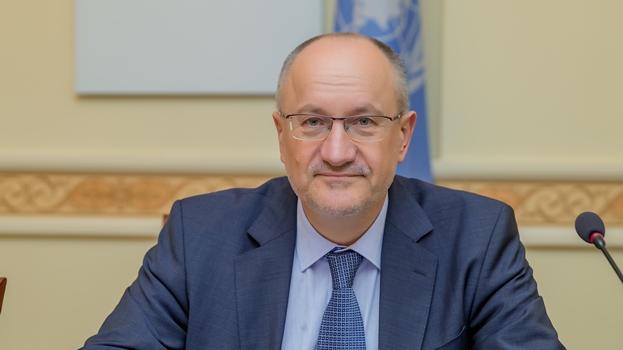ASHGABAT, Turkmenistan
On 12 November, Mr. Petko Draganov, Special Representative of the UN Secretary General and Head of the UN Regional Center for Preventive Diplomacy for Central Asia (UNRCCA), participated in a video Panel Discussion devoted to “Policy of Neutrality: International cooperation for peace, security and development”, in New York organized by the Permanent Mission of Turkmenistan to the United Nations with the support of the United Nations Department of Political Affairs.
On this occasion, SRSG Draganov delivered a video message dedicated to the 20th anniversary of Turkmenistan’s neutrality.
Excellencies,
Dear colleagues,
I am so delighted to reach out to you from Ashgabat and talk about Turkmenistan's Neutrality. When 20 years ago the UN General Assembly adopted a resolution on the country’s permanent Neutrality this was, I believe, the first time a country’s neutrality was being officially recognized by the United Nations. Notably, the resolution welcomed, and I quote “the desire of Turkmenistan to play an active and positive role in developing peaceful, friendly and mutually beneficial relations with the countries of the region and other States of the world”.
And, last, June 3rd 193 states at the UN unanimously confirmed the “Permanent Neutrality of Turkmenistan”. In this new resolution, the General Assembly reiterated its support for Turkmenistan’s status of permanent Neutrality and called on the Member States “to respect its independence, sovereignty and territorial integrity”.
These two resolutions are not just symbolic acts by the UN Members states. They reflect the unanimous recognition by the international community of the value of Turkmenistan’s Neutrality and of the benefit it brings to peace, stability and cooperation in Central Asia.
Neutrality has for many years performed a critical function in International relations. Its core principles were codified back in the 19th century and are part and parcel of international law. To date, they preserve their fundamental importance and compatibility with the broader system of collective security created by “we, the peoples of the United Nations” some 70 years ago.
This 20th anniversary is a good opportunity to look back at what the country has achieved both at home and in the wider region. The various events organized by the Turkmen authorities during the year of “Neutrality and Peace” allow for such an assessment. It is only fitting that the forthcoming high-level international conference on “The policy of neutrality: international cooperation for peace, security and development” on December 12th in Ashgabat should crown a busy year-long agenda. I understand the event will be attended at a high level by many invited participants.
Let me state that far from being a policy of “self-isolation”, Turkmenistan’s concept of “positive” neutrality, has allowed the country to make significant contributions to the UN, join various international bodies, agencies and processes of cooperation; I can bear witness that Turkmenistan’s positive neutrality has been instrumental in the country’s active role in the region, promoting stability, good neighborly relations and regional cooperation, which the UNRCCA warmly welcomes.
This status has indeed contributed to the application of our SG’s concept of preventive diplomacy in Central Asia, with the establishment of UNRCCA, and the continuous support of the Turkmen Authorities to the Centre’s mandate and activities. During his recent visit to Ashgabat and the meeting we had with President Berdimuhammedov SG Ban Ki Moon once again paid tribute to this strong support and partnership.
On a number of occasions, Turkmenistan has offered its territory and its good offices for talks between opposing parties. One could refer to the role the country played in facilitating peace talks between various Tajik actors in 1995-96, or to its significant contribution to peace talks among conflicting parties in Afghanistan, in 1997.
Today, more than ever, in a globalized world where developments in any given region affect all of us, Turkmenistan’s “positive” neutrality represents a pillar of regional stability. Let me mention that this policy of neutrality has also translated into a great vision of transport, trade, infrastructure, connectivity, and energy security, as illustrated by the projects that the government of Turkmenistan supports, in the country, in the region, and beyond. Such projects are, in essence, yet another contribution to security and stability that we should all acknowledge.
I therefore wish to congratulate the people, the Government and the President of Turkmenistan as the country prepares for a momentous celebration, which I am looking forward to attending.


